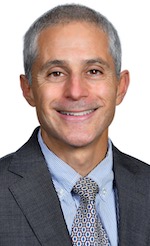Daily Business Report-March 6, 2019
Photo courtesy of San Diego Gas & Electric.
Community Choice agencies
could become the new power monopoly
By Ry Rivard | Voice of San Diego
Back in the 1990s, Paul Fenn decided to write a law. He wasn’t sure what the law would be, but in the way graduate students do, he’d gotten interested in changing the world. After consulting with a professor at the University of Chicago – Robert Coase, the Nobel Prize-winning economist who inspired cap and trade programs – Fenn decided to write a law about energy.
Fenn wasn’t a fan of cap and trade, an attempt to curb air pollution using market forces. His law would put local governments in charge of buying and selling electricity, rather than big private power companies, and he hoped the power they bought would be greener – green enough to curb climate change. He eventually called the idea “community choice.”
It never occurred to him that his law would pass, much less transform the California energy market.
Fenn got a bill through first in Massachusetts in 1997. Fenn tried and failed to get a version of the law passed in California. Then the energy crisis came along.
In Fenn’s telling, lawmakers were panicked by the deregulation they’d unleashed and were looking for bills to help contain the damage. They saw his idea and ran with it.
“They were literally ripping it out of my hands. Carole Migden, she smelled meat, and she just went for it,” he said, referring to a former assemblywoman and state senator from San Francisco who sponsored the bill.
The law passed. Even Fenn expected the number of governments that formed their own energy agencies would be limited – it would be perhaps a Bay Area thing.
Now, there are 19 government-run community choice energy agencies up and running in California and more to come, including one the city of San Diego is trying to form.
These agencies, known as CCAs, could soon become monopolies in their own right.
That’s because they may be the only game left in town. Both San Diego Gas & Electric and Pacific Gas & Electric are looking to exit the energy market.
That may sound like it’s bad for business, but it may be more of an opportunity for those companies. A well-run utility can make a steady profit from charging customers for use of poles, wires, cables and meters that help deliver energy to their homes.
PG&E, in bankruptcy, is open to exiting the energy market so it can focus on ensuring its lines don’t spark fires. And SDG&E is also looking to shed the responsibility of buying and selling power in a transforming market.
Community choice’s success is poised to alter some of the rhetoric around the agencies, which were once the scrappy upstarts.
The “choice” in community choice has come to mean two things. Universally, it’s meant that communities – in this case, local governments – decide what type of electricity they use.
But activists and politicians alike have portrayed the choice as one consumers will have between the government-run agency and a privately-owned company, like SDG&E.
Two prominent Republicans, Mayor Kevin Faulconer and San Diego County Supervisor Dianne Jacob, have positioned a regional CCA they want to form as market competition, an alternative to SDG&E.
“For decades San Diegans have only had one option on where they get their electricity,” Faulconer said when the City Council approved his CCA plans. “Community choice will change that by injecting healthy competition into the marketplace, allowing customers to benefit from lower energy costs, and pick greener energy sources to power their home or business.”
Jacob, similarly, said approving a CCA would allow customers to “shop” for power.
But if SDG&E exits the market – an admittedly big if that would require state legislation – that may not be the case. There might be another statewide energy entity that could serve customers, but CCAs would essentially become a new monopoly.
CCA advocates agree customers may not have a choice between energy providers in the future, but they will still have choices about how the agency is run.
Craig Gustafson, a spokesman for the mayor, said while healthy competition was one selling point for Faulconer, it wasn’t the only one.
“The biggest selling point for community choice is establishing local control so we can lower energy costs for ratepayers and ensure we meet the goals of the Climate Action Plan – both of which weren’t possible under the proposal from SDG&E,” he said, referring to the city’s deadline of using only green power by 2035. “We’re confident a regional not-for-profit [CCA] will be able to provide lower costs for ratepayers as this is demonstrated by municipal utilities around the state having lower costs than investor-owned utilities even though they don’t directly compete for customers.”
Nicole Capretz, head of the Climate Action Campaign that made community choice a political reality in San Diego, had used arguments about competition while selling the idea over the past few years in order to appeal to business owners and conservatives. She said the market has changed rapidly – faster than expected – and that a public agency would be better than a private company anyway.
“Honestly, where we come from, when we’re talking about an essential human need like electricity, that is probably best left in the hands of a nonprofit public-purpose agency,” she said.
____________________
SDSU Mission Valley
negotiation team announced
San Diego State University President Adela de la Torre has announced the selection of seven university representatives and consultants to represent SDSU in negotiations with the city of San Diego for the purchase of the Mission Valley stadium site:
• Jennifer Chavez, real estate attorney, Sheppard Mullin
• Domenic Drago, real estate attorney, Sheppard Mullin
• Gina Jacobs, assistant vice president, business and financial affairs, San Diego State University
• Aarti Kewalramani, CEQA attorney, Gatzke Dillon & Ballance
• John Kratzer, chief executive officer, JMI Realty (Serving as a consultant to the university. JMI Realty is not participating in the development of the property.)
• Tom McCarron, vice president of business and financial affairs and chief financial officer, San Diego State University
• Sally Roush, retired president and former chief financial officer, San Diego State University
SDSU has received a Right of Entry permit for the stadium site in order to continue progress on its draft Environmental Impact Report for their proposed development. These due diligence efforts have set the stage for the next phase of negotiations to begin following City Council approval of the consultant contract in March.
____________________
Promising compound selectively
kills brain cancer stem cells
Scripps Research scientists have discovered a compound that potently and selectively kills the stem-like cells that make glioblastoma brain cancers so deadly.
In a study published this week in The Proceedings of the National Academy of Sciences, the Scripps Research scientists found that the new compound, which they dubbed RIPGBM, kills glioblastoma stem-like cells cultured from patients’ tumors with more than 40 times the potency of the standard GBM drug temozolomide. They found too that RIPGBM is highly selective, sparing other types of brain cells, and that it powerfully suppresses the growth of GBM tumors in a mouse model of the disease.
“Our discovery of this compound and the cellular pathways it affects offers a promising new strategy for treating glioblastoma,” says principal investigator Luke Lairson, an assistant professor of chemistry at Scripps Research.
____________________

70 high-tech cameras installed in
Southland provide eyes on fire prone areas
A multi-hazard camera technology developed at the University of California San Diego and the University of Nevada Reno that improves fire detection and response capabilities is expanding to include 70 cameras in high fire risk areas throughout Southern California.
The ALERTWildfire Camera Network connects firefighters with real-time fire activity and provides situational awareness that allows first responders to scale their response accordingly. The network now features more than 160 cameras throughout California, Nevada, Oregon, Washington, and Idaho, enabling high-definition, on-demand time-lapse imagery, including many with live video and near infrared night vision to detect smoke, pan-tilt-zoom functions and more. Fire officials have full control of the cameras to monitor fires, triangulate on the location of fires at their earliest stages, and confirm 911 reports. Read more…
https://scripps.ucsd.edu/news/seventy-high-tech-cameras-installed-southern-california-provide-eyes-fire-prone-areas
Susan Munsey at San Diego Women’s Week
As a teen, Susan Munsey was lured into a life of prostitution in Southern California, where she learned about the abuse of young women firsthand. Eventually she was able to escape that world to become a clinical social worker and a psychotherapist. In 2009, Munsey founded GenerateHope, a nonprofit that offers a safe place for survivors of sex trafficking to heal and build new lives. The group provides long-term housing, therapy, education and medical care.
To date, Munsey says GenerateHope has been a refuge for more than 100 victims — some as young as 18. Participants attend classes to get caught up on their high school education and prepare for college. They receive therapy focused on their traumatic experiences. Women can stay at GenerateHope’s safe house for up to two years and benefit from a variety of volunteer-led support services, such as equine and art therapy, dance and yoga.
Munsey will speak at the Kick Off Luncheon April 1 as part of San Diego Women’s Week sponsored by North San Diego Business Chamber. Women’s Week runs April 1-5. Click here for the schedule.
____________________
City Council votes to reduce parking
requirements at transit priority areas
The San Diego City Council voted Monday to reduce parking requirements at new multifamily residential developments within Transit Priority Areas (TPAs). This measure was first introduced over two years ago as a part of a 20-point housing plan by Councilman Scott Sherman and former Councilman David Alvarez. The reform will decrease the cost of developing multifamily developments, helping to fix the dire housing crisis San Diegans face.
The ordinance will reduce parking requirements for multifamily residential developments within TPA’s from a minimum of one parking space to zero. In addition, building applicants will be required to provide varying levels of transportation amenities based on a Transportation Amenity Score.
With the elimination of minimum parking requirements in TPAs, building construction would be less expensive with the benefit passed on to the homebuyer.
____________________
FBI San Diego Citizens Academy Alumni Association
co-sponsors “FBI Women Behind the Badge” event
The Federal Bureau of Investigation (FBI) San Diego division will host the first annual “FBI Women Behind The Badge” event on March 28. Local business leaders are invited to learn about community engagement opportunities with the FBI.
Attendees will learn about FBI community partnerships and outreach resources. The evening will begin with light refreshments at a networking mixer, where participants can meet current and retired FBI Special Agents.
Event co-sponsors — FBI San Diego Citizens Academy Alumni Association, InfraGard, and Qualcomm — will briefly share their diverse experiences as community partners.
A panel discussion will feature female special agents who joined the FBI from a variety of professional backgrounds. Hear how they went from being lawyers, engineers, and bankers to FBI agents and learn about their career journeys. There will be time for questions and answers at the end of the evening.
Space is limited for the event 5:30 – 8 p.m. Exact location about the venue in Sorrento Valley will be sent to registered attendees. The event is open to the public with advance registration. Click here.
____________________
Personnel Announcements
Brian Fish joins San Diego office of Buchalter

Brian Fish has joined Buchalter as real estate and land use shareholder in the law firm’s San Diego office. He was previously with Dentons.
For more than 22 years, Fish’s practice has covered all aspects of real estate development including land use, permitting/entitlements, public/private partnerships, public contracting, and environmental matters. He has extensive experience assisting public and private clients with California Environmental Quality Act (CEQA) compliance, coastal permitting, planning and zoning issues, Subdivision Map Act processing, Williamson Act issues, condominium conversions and prevailing wage analysis. He also represents clients before administrative agencies, and handles litigation at the trial court and appellate court levels, with respect to public contracting issues, entitlements, CEQA, Subdivision Map Act and other land use and real estate related matters.
Fish received his J.D. from Emory University School of Law and his B.A. from the University of California San Diego in Urban Studies & Planning.




